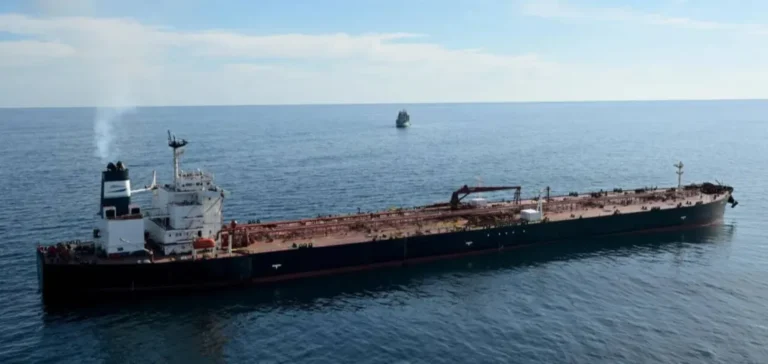The Boracay oil tanker, seized off the French coast last Saturday, resumed its voyage during the night from Thursday to Friday, according to data from maritime tracking systems. The vessel had been redirected to Saint-Nazaire as part of a judicial operation concerning inconsistencies in its declared nationality and the absence of a flag, characteristics typical of ships belonging to the so-called “shadow fleet” used by Russia to bypass Western sanctions.
Boracay was carrying a cargo bound for India
According to information from the French judiciary, the tanker was carrying a shipment of oil originating from the port of Primorsk, near Saint Petersburg, and was initially en route to Vadinar, India. This city hosts the country’s second-largest refinery, operated by Nayara Energy Limited, a company 49% owned by Russian oil giant Rosneft. The destination is included in the 18th package of European sanctions introduced in July.
The ship’s captain and his first officer, both Chinese nationals, were taken into custody and later released on Thursday. The captain is expected to appear before the Brest court in February for disobeying orders, while no charges have been filed against his first officer.
Paris intensifies its obstruction policy
The seizure of the Boracay is part of what the Élysée has called a “policy of obstruction” targeting maritime flows contributing to Russia’s financial capacity to wage war in Ukraine. French President Emmanuel Macron stated that this clandestine fleet generates more than EUR30bn ($32.24bn) annually, accounting for up to 40% of Moscow’s wartime revenues.
During a European summit in Copenhagen, Macron announced an upcoming meeting of military chiefs of staff, coordinated with the North Atlantic Treaty Organization (NATO), aimed at developing a joint response under the framework of the Coalition of the Willing to provide security guarantees to Ukraine.
A fleet difficult to trace
The Boracay, a 244-metre-long tanker built in 2007, exemplifies the difficulty of tracking such vessels. Data shows it has operated under at least seven different flags, including those of Liberia, Djibouti, and Hong Kong. Frequent changes in registration, the use of offshore-based owners, and the regular deactivation of transponders make identification and tracking complex.
A total of 444 vessels are currently subject to European Union sanctions. A military source indicated that between 10 and 15 shadow fleet tankers pass off the coast of Brest each day.
Accusations rejected by Moscow
Russian President Vladimir Putin described the Boracay’s seizure as “piracy”, claiming the vessel was in international waters and carried no military goods. While denying any direct Russian involvement, he accused France of provoking an escalation without legal grounds.
Additionally, there has been speculation about a possible link between the Boracay and drone flyovers reported in Denmark in late September. No evidence has been provided to support such a connection, and French authorities have not launched an investigation on that matter.






















